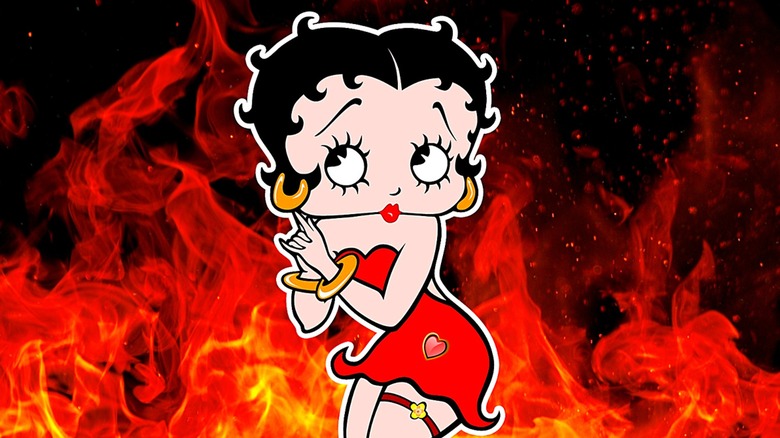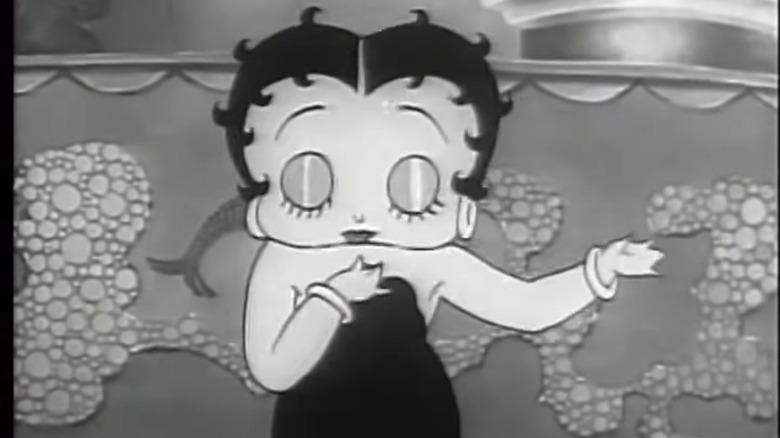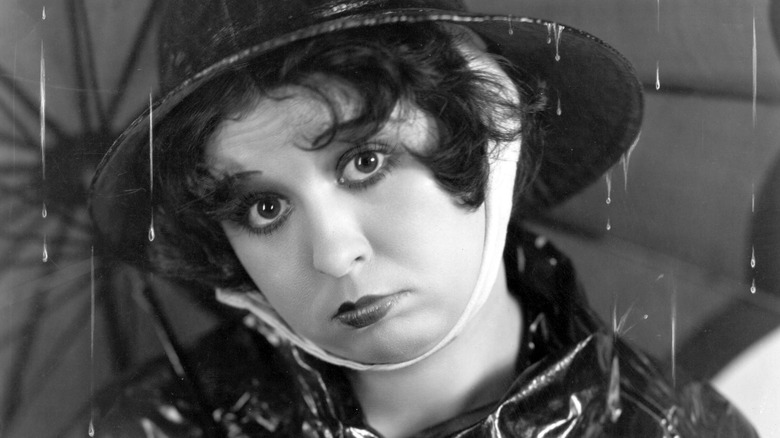How Betty Boop Became A Source Of Fake News And Controversy
Almost 100 years ago, Max Fleischer created Betty Boop. The animated icon, and one of the best cartoon characters of all time, is stylized like a 1920s flapper girl, complete with short, slick curls and an even shorter dress. Although it varied over the years to maintain a sense of modernity, Betty Boop's singing style remains anchored in scat jazz. Not just any scat jazz, either; she's famous for a certain infantile cooing that plays into her stereotypical sex kitten demeanor. According to a vocal percentage of thinkers, that cooing belonged to someone else. In 2015, PBS posted an article entitled "Ten Little Known Black History Facts" as part of its Black History Month coverage. That article postulated that Fleischer stole the visual and tonal style of popular jazz singer Esther Lee Jones, aka Baby Esther, to build Betty Boop.
It's important to note that Betty Boop is animated as a white woman and Baby Esther is a young Black girl. The accusation here isn't just that an artist stole from another artist and profited off of their likeness, but that a white creation profited from the labor of a Black artist. There's a wealth of evidence from similar situations that permitted a context for believability in PBS' claim.
But sometimes, even good intentions lead to bad results. In 2021, PBS retracted the article because it featured unfounded claims. The site released a new article entitled "Betty Oops" explaining the retraction as a necessary consequence of unsubstantiated positions. No proof directly linked Betty Boop to Baby Esther, only to the movement that also inspired the jazz starlet.
Fleischer Studio offered a lot of statements
Six years — that's how long PBS allowed its article peddling misinformation to stand without contest. Mark Fleischer, Max Flesicher's grandson and the current CEO of Fleischer Studios, was quoted in PBS' retraction as saying, "It really troubled me that a source as trusted as PBS would repeat and assert conclusions without first ensuring that there was a factual foundation to support those conclusions. In this case, no such foundation existed." More troubling still, "Betty Oops" admits that PBS only dug deeper into the claims made in "Ten Little Known Black History Facts" because an anonymous observer pointed out that the attached image of Baby Esther was not, in all likelihood, an image of Baby Esther.
On Fleischer Studios' website, the current CEO addressed the retraction, saying, "While it is gratifying to see this story corrected and freshly researched by a news outlet that has been thorough and transparent in its process, we also recognize that the viral spread of this misinformation was born of a sincere effort to retrieve and lift up the voices and stories of so many long-neglected African American artists." The studio's statement then went on to offer a biography of Baby Esther's life and career and explained why it might be feasible for some to assume her the true origin of Betty Boop. The story involves a failed lawsuit and an irate white artist professing blanket ownership of jazz music.
Helen Kane accidentally linked Betty Boop and Baby Esther
In 1932, white jazz artist Helen Kane filed a lawsuit against Max Fleischer and Paramount Studios claiming that Betty Boop was a "deliberate caricature" of her stage work, per Fleischer Studios. Like more recent theorists, Kane believed that Betty Boop's high-pitched, childlike scatting interpolations were indicative of theft. She referred to the style as "baby vamp" and fiercely defended it as her unique invention. Kane's lawsuit fell apart as soon as other musicians were brought to provide evidence, all of whom said that Kane's preferred sound stemmed from a rich and popular vein of music shared by an entire community.
What's more, the trial led to evidence indicating the possibility that Kane co-opted baby vamp from Baby Esther. Kane's credibility died during the lawsuit, but the transitive link she created between Betty Boop and Baby Esther sparked the fire that would ultimately lead to PBS' now-retracted article.
Betty Boop is an homage to an entire era of music and performance. In truth, there are cartoon characters inspired by real people, and Helen Kane and Baby Esther likely influenced various design elements for Fleischer's creation, but no lone figure may lay claim to Betty Boop's total inspiration. And so, in 2023, Fleisher's sex icon lives on. Sure, so does misinformation, but Betty Boop's got enough goodwill for popular celebrities to sport her likeness during Halloween festivities. Fortunately, any controversy stemming from that belongs to Ice Spice and not Fleischer Studios.


